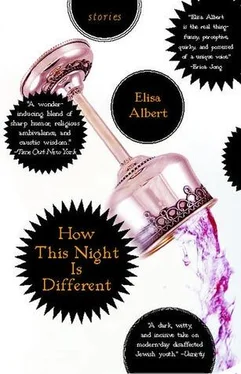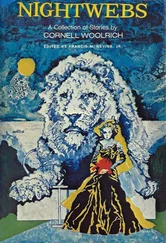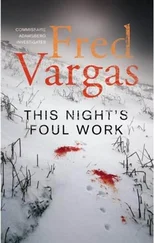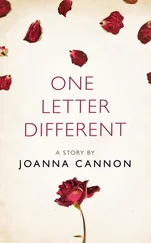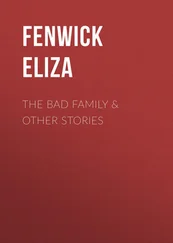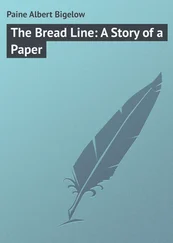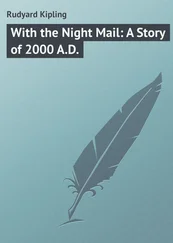When he was finished, Harris looked up at her. He was doing this for her. He loved her this much. What did one do with this kind of love? Love that did not bestow broken heirlooms or moot promises or venereal disease? One of these things was most definitely not like the other.
“We searched the house for hametz today,” Ron boomed, winking at Joanna. “Didn’t we, pumpkin?”
“Yes,” added Marilyn, “so you can all rest easy. The house is clean!” There was no end to the inferiority complex wrought by Barbi. Historically they despised each other.
“So on page one,” Ron went on, “we’ll repeat the blessing we said earlier, when we burned the last of the bread. This second time, it’s actually letting us off the hook a little, in case we missed anything when we did our search. Because nobody’s perfect, right?” Again he winked at Joanna. He seemed to wink at her more often in direct proportion to how much older she’d gotten since the last time he’d taken note.
He repeated the blessing for all the hametz they might not have found, a blessing for the blind spot, the things invariably missed. Uncle Steve, obedient and entirely without social skills, read along.
“Any leaven in my possession, which I have or have not seen, which I have or have not removed, shall be as if it does not exist, and as the dust of earth.” It was the second time she’d heard this today, and for the second time Joanna wondered if she wasn’t glowing pink and fluorescent yellow and ultraviolet, if it wasn’t totally obvious to anyone capable of looking, of really looking, that this implicated her in a hundred ways.
Where was the blessing for Unbearable Vulvar Itch? She flipped impatiently through her Hagaddah, squirmed in her seat and squelched the all-but-irresistible urge to grind her fist into her lap, a thousand red ants congregated in her crotch.
They did the kiddush and drank the first of way too many cups of sickly sweet wine, they passed around a big bowl and pitcher and ceremoniously washed their hands. They dipped parsley into salt water and munched like horses. Ron broke the middle matzo and wrapped half in his napkin for the afikomen, making a big show of it and smiling broadly at the “kids”—Joanna and Stacey and Jason and Kevin.
Back in the day, this had been the best thing about Passover. A Jewish equivalent to the Easter egg hunt. “After the meal,” said the old “Pathways to Freedom” Haggadah, “the children search for the half of Matzah which has been hidden. The one who finds it is to be rewarded. When the hidden part is found, the two halves are put back together again. This is a sign that what is broken off is not really lost to our people, so long as our children remember and search.” And on taped-in, blinding orange paper, Ron’s feminist, postmodern, politically relevant addenda: a midrash about soulmates, about two halves of a whole reunited for the order of life to be complete.
The dining room table, so deliberately laid, was beginning to be messed with now, plates pushed an inch this way or that to make room for Uncle Larry’s elbows or Aunt Jackie’s inhaler. There were no children at this Seder; there would be no shouting, giggling, running to find the afikomen when the time came. She and Stacey and Kevin and Jason would be coerced into a mock search for the thing (which Ron will have “hidden” in plain view under the piano) and then be rewarded with something asinine, like a dime.
Of course she was going to have to ask the goddamn Four Questions. She was a jackass for thinking she’d get out of it, now or ever. She was an only child, she was the youngest cousin. It had been her job since she could read, since she could be trusted to make the table Look Pretty. How is this night different from all others? It’s not, twat.
But when they turned the page, Joanna bracing herself for the indignity of asking, in song, at thirty-one years of age, in front of her boyfriend, with this bogus traditional wonderment, what it was all about, she saw that Ron had supplanted the traditional questions with something new, Xeroxed on fluorescent purple: How Different This Night Is! It was a statement, rendered with full shock and awe. How different this night is! She almost laughed out loud, because this she could sing, this she could relate to her own experience! An exclamation point! This night was goddamn Different, and in more ways than one! Question mark? Feh!
From her own precise location on the map of things, Joanna was going to tell them all how it was. No more asking; she was a woman now. No amiable, broad, open-ended, question-marked wondering! Listen up, motherfuckers!
“Joanna, my darling girl,” Ron said. “Will you do us the honor of telling us how this night is different?” Harris wore an expression of overwrought interest, eyebrows raised, that recalled for Joanna the playground admonition to be careful lest one’s face get stuck that way. She stared at him for a calm moment, then smiled at her father.
“I will.”
In her backpack for Auschwitz, Shayna Markowitz packs the following: sunblock, a date-nut bar, her passport (it was just smart to have it on her at all times, her parents kept repeating, somewhat menacingly, when they saw her off), the required copy of Elie Wiesel’s Night, and her own crisp, snow white, entirely blank journal (out of which she’s thus far torn nine ill-begun, stupidly written pages and counting).
The morning is freezing cold, and Rabbi Amy goes from door to door, knocking them awake before it’s light out. Knock, knock, knock, Good morning! Knock, knock, knock, Good morning! All down the hallway of the Hotel Continental.
“Today is Auschwitz,” she writes in the journal. It is terrible that this will be her first entry — they’ve been in Poland for two days already — but nothing she’s attempted to put down yet has been remotely worthy. She thinks for a minute, reads that sentence over, then goes on: “(well, actually, it’s Tuesday, but you know what I mean).” But that won’t do either, not at all, and Shayna goes to town on the binding and rips out the page, eradicating her pathetic words. Another blank page stares placidly up at her. “Today we go to Auschwitz,” she ventures, but regrets immediately writing “go to” in place of “tour,” which makes it sound eerily like a journal entry of someone in a cattle car in 1943, and which Shayna fears is sort of disrespectful.
Breakfast is a somber affair: some waxy bagels, rock-solid cubes of cream cheese, and yet more of the same pale, half-frozen honeydew they’ve been served at every meal.
“This is so nasty,” says Jessica Berman.
“I know,” says Jamie Ziegler. “I’m starving, and I only have like three Power Bars left.” Shayna makes a mental note to offer Jamie some of her date-nut bar later, at an especially crucial, emotionally pitched moment. At the crematoria, maybe.
“I heard there’s a snack bar there,” Jessica says. “Seriously. I heard that.” But then, catching herself— Auschwitz! — she sets her mouth into something of a grimace and loads up a plate without another word. It is the spring of their eleventh-grade year. They are bus three of the northeastern delegation of We Are the Living.
“How you doing, Shay?” asks Jonah, making Shayna’s whole chest collapse and then expand hugely within about two seconds (the mysteriously linked words “finger” and “bang” ricocheting around, uninvited, in her brain).
Jonah is friends with Shayna’s older brother, Max. They came on this trip together five years ago and now Jonah is back to help lead it. Shayna has been snooping around in Max’s room since she could walk, and aside from a particularly sour-smelling, dog-eared stash of soft-core porn, her greatest find had been Max’s embossed leather journal from his time in Poland, which she’s read cover to cover a number of times. She knows whole sections of it, she’s finding, by heart. So in a way she feels like she’s already been here.
Читать дальше
